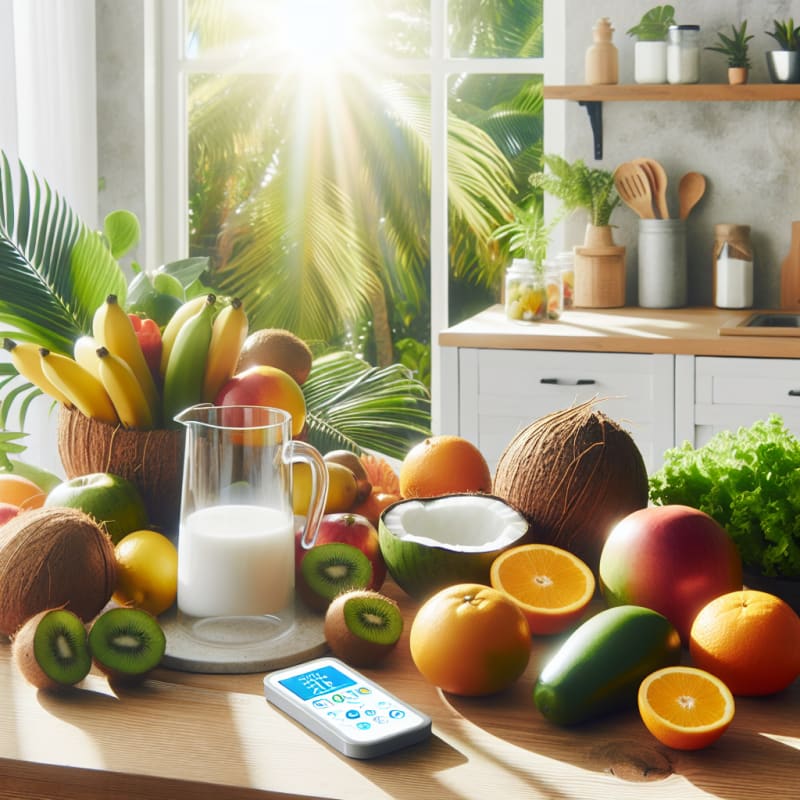Never Drink Coconut Water Directly from the Coconut: How Contamination Can Harm Your Health
Updated June 2024 — With the rising popularity of natural beverages, coconut water is often seen as a healthy, hydrating choice. But recent reports, including a Times of India article, highlight a hidden danger: drinking coconut water directly from the coconut can expose you to harmful contaminants. This article explores the risks, food safety regulations, and how smart tools like Food Scan Genius can help you make safer choices—especially if you have food sensitivities or specific dietary needs.
Why You Should Never Drink Coconut Water Directly from the Coconut
While coconuts look clean and natural, their outer shells are exposed to dirt, bacteria, pesticides, and even fecal matter during harvesting, transport, and storage. When you pierce the shell to drink directly, these contaminants can enter the water inside. According to research published in the International Journal of Food Microbiology, coconut water can harbor dangerous pathogens such as Salmonella, E. coli, and Staphylococcus aureus if not handled or processed hygienically.
| Pathogen | Potential Health Impact | Prevention |
|---|---|---|
| Salmonella | Gastroenteritis, fever, diarrhea | Proper washing, pasteurization |
| E. coli | Severe stomach cramps, vomiting | Sanitary handling, avoid direct consumption |
| Staphylococcus aureus | Food poisoning symptoms | Clean tools, hygienic packaging |
How Contamination Happens: Real-World Examples
- Unwashed Surfaces: Coconuts often touch soil, animal droppings, or dirty hands before reaching you.
- Improper Storage: Warm, humid conditions accelerate microbial growth.
- Unsafe Piercing Tools: Vendors may use unclean knives or straws, introducing bacteria directly into the coconut water.
Recent news, such as Food Safety News reports, show a spike in foodborne illness outbreaks linked to improper handling of fresh produce and beverages. In 2024, several coconut water brands faced recalls due to contamination risks, underscoring the importance of safe consumption practices.
Food Safety Regulations: US vs. EU
| Region | Key Authority | Labeling Requirement | Allergen Disclosure |
|---|---|---|---|
| United States | FDA | Must list all ingredients; pasteurization status required | Mandatory for top 9 allergens; coconut classified as a tree nut |
| European Union | EFSA | Ingredients, origin, and processing method must be disclosed | Mandatory for 14 allergens; coconut labeling varies by country |
Tip: Always check the label for pasteurization and allergen information, especially if you have food sensitivities. The FDA and EFSA provide up-to-date guidance on safe labeling and food safety alerts.
Emerging Food Trends & News: What’s Changing in 2024–2025?
- Plant-Based and Functional Beverages: Demand for safe, plant-based drinks is rising. Brands are investing in better packaging and traceability (Food Dive).
- Stricter Labeling Laws: New EU regulations require clearer disclosure of allergens and processing methods. The US is considering similar updates for imported beverages.
- Food Recalls: Several coconut water brands have been recalled in the past year due to contamination, as reported by Food Safety News.
How to Safely Enjoy Coconut Water
- Choose Packaged, Pasteurized Coconut Water: Look for reputable brands with clear labeling and safety certifications.
- Wash the Coconut Thoroughly: If consuming fresh, wash the shell with clean, running water and a food-safe disinfectant.
- Use Clean Tools: Always use sanitized knives and straws.
- Check for Recalls: Stay updated on product recalls through official sources and food safety apps.
Food Scan Genius: Your Partner in Safe Food Choices
If you have food allergies, sensitivities, or specific dietary preferences, the Food Scan Genius app makes it easy to scan coconut water and other products for allergens, ingredient origins, and contamination alerts. The app uses real-time data and global regulations to help you avoid risky products.
User Testimonial: “I have a coconut allergy, and Food Scan Genius helped me spot hidden coconut derivatives in packaged drinks. It’s a must-have for anyone with food sensitivities!” – Priya S., New York
FAQs: Coconut Water Safety
- Q: Is packaged coconut water safer than fresh coconut water?
A: Yes, packaged coconut water is usually pasteurized and tested for contaminants, making it safer than drinking directly from a fresh coconut. - Q: What should I look for on the label?
A: Look for “pasteurized,” allergen information, and expiration date. Use apps like Food Scan Genius to verify hidden ingredients. - Q: Can coconut water cause allergies?
A: Yes, coconut is classified as a tree nut in the US and can cause allergic reactions in sensitive individuals.
Conclusion: Make Informed, Safe Choices Every Time
Understanding the risks of drinking coconut water directly from the coconut is essential for your health—especially if you have allergies or dietary preferences. By staying informed about food safety alerts, reading labels carefully, and using apps like Food Scan Genius, you can confidently enjoy coconut water and other foods without compromising your well-being. Smart food choices start with knowledge and the right tools—scan before you sip!
References: International Journal of Food Microbiology | FDA Food Labeling | EFSA Food Allergens | Times of India | Food Safety News | Food Dive





